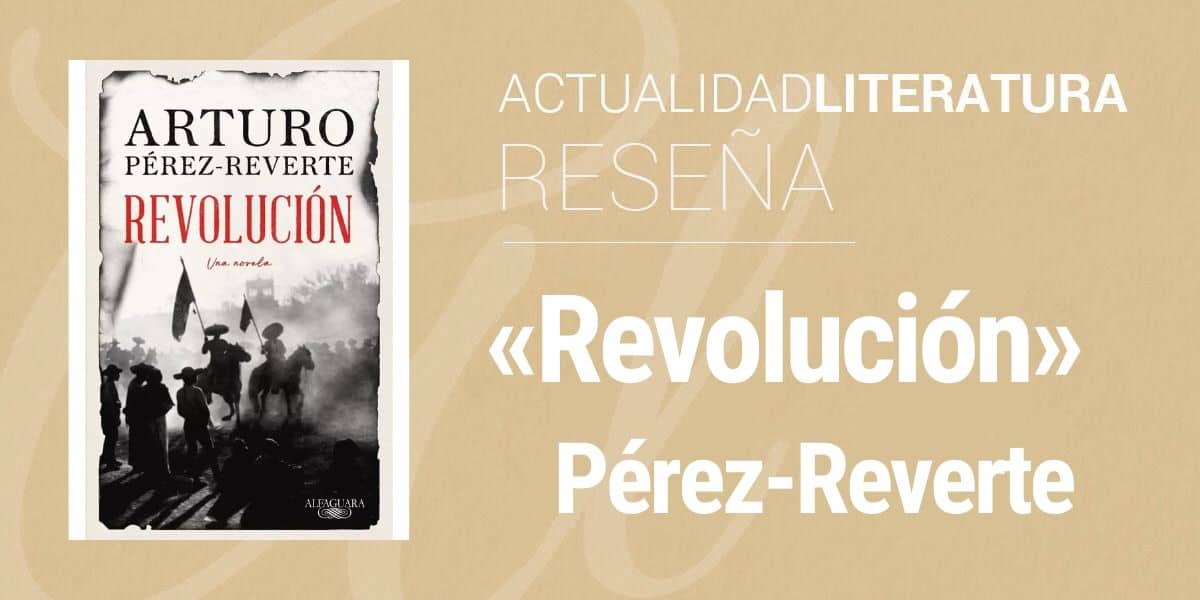
Revolution
Revolution. A novel is a historical account written by the Spanish reporter, journalist and author Arturo Pérez Reverte. The work was published by the Alfaguara publishing house in 2022. Since its release, the book has had mixed reviews. Some readers claim that Revolution It is one of those great Pérez Reverte titles. For others, the text is nothing more than a story that remains half measures: it does not move or bore, it is what is expected, and yet something is missing.
On the other hand, the most optimistic opinions regarding Revolution they talk about how well documented the book is, and how the author manages to expose the facts of a political and economic period of a people, endowing them with violent, sad, overwhelming, disembodied moments... among other adjectives. As in any work worth reading, this novel by Arturo Pérez Reverte is taken with ambiguity by the reading public.
Synopsis of Revolution
The story of a war
Revolution. The novel focuses on timing two of the greatest leaders of the revolt that led to the liberation of Mexico: Francisco Villa and Emiliano Zapata, who were active around the first third of the last century.
In this context, the story of Martín Garrett Ortiz develops, a young Spaniard who works in the Mexican mines as an engineer. Another of the protagonists is Diana Palmer, a journalist who knows very well who she is. These two interesting characters are accompanied by Maclovia Ángeles, a woman allied to soldiers in battle, from whom she has inherited weathered cheeks and a broken heart.
A bond stronger than gold will form between them.. It is a bond that speaks of friendship in the least ideal times, of love, of the unspoken rules that must be learned in order to live life, but, above all, of how to face death with courage.
Armed scandal: the theft of gold
The fact that triggers the plot of Revolution It is dramatic, due to the setting where it took place and its consequences. On May 8, 1911, fifteen thousand gold coins of twenty pesos were stolen. These were called “maximilianos”, and were extracted from the Ciudad Juárez bank. Shortly after, a shooting broke out, which caused Martín Garrett Ortiz to leave the hotel where he was staying and go to see what was happening at that moment.
From then on, the life of the young mining engineer changes forever., because he must see for himself how revolutions are put together, and all the sacrifice that they entail. Arturo Pérez Reverte's novel shows us that there are struggles that cannot be won, that, in fact, may be doomed to failure. However, it is necessary that they exist, because they exalt men, because they sow paradigms.
Many times, rather than winning, the objective of revolutions is to ensure that future generations have a better quality of life.
Why does Arturo Pérez Reverte choose the Mexican revolution to situate his novel?
According to the author, since he was a child he heard his great-grandfather talk about a dear friend. As in his work, it was about a young mining engineer working in Mexico during the time of the revolution by Francisco Villa and Emiliano Zapata. That childhood memory of his has influenced his entire life, and now, at last, he captures it vividly through a title brimming with learning. Arturo Pérez Reverte affirms that this is the biography of his youth.
About the pen of Pérez Reverte
For many authors, any book by Arturo Pérez Reverte has a very easy to identify identity stamp printed on it. His style —a personality that every artist or creator wants to achieve— may come from all the tasks that the writer lived as a correspondent for RTVE and a war reporter. After all, after having been through so much darkness, who could recount the conflicts better than someone who saw them firsthand?
What can be learned from Revolution?
At the beginning of any writing career there is a great desire to use as many words as possible. In this case, all the linguistic resources are precisely located. Not for nothing, the author is a number academic at the RAE.
Revolution It deals, above all, with the lurid events that ultimately resulted in the freedom of Mexico. The entire armed conflict around these events is narrated by the pen of Arturo Pérez Reverte in a fluid and entertaining way.
Through the novel readers can gain insight into the context of what XNUMXth century Mexico was like. Obviously, with fiction as the main resource, because although the work contains history, we must not forget the literary within it, that is: the invention, the enrichment of the anecdote in conjunction with the appreciation of the writer and the whimsical prose. of the.
About the author, Arturo Pérez-Reverte

Arturo Perez-Reverte
Arturo Pérez-Reverte Gutiérrez was born in 1951, in Cartagena, Murcia, Spain. Pérez Reverte was expelled from the Maristas de Cartagena, where he did part of his high school. After his unseemly departure, he completed his studies at the Isaac Peral Institute, with a Mention in Letters along with other professors who live in modern literature. After finishing his secondary studies, the Murcian decided to take a degree in Journalism from the Complutense University of Madrid.
Thanks to his career, Pérez Reverte He worked as a reporter and war correspondent for 21 years. This work influenced his literary career later. Likewise, he was editor-in-chief for the magazine Defensa, which he founded together with his partner and friend Vicente Talón. Over the years, Arturo has written several important works, and has been the recipient of some awards, such as the Goya Award (1992).
Other books by Arturo Pérez-Reverte
- Hussar 1986;
- Fencing master 1988;
- The Flanders table 1990;
- The Dumas Club or The Shadow of Richelieu 1993;
- The shadow of the eagle 1993;
- Comanche territory 1994;
- A matter of honor 1995;
- Drum skin 1995;
- The spherical letter 2000;
- The Queen of the South 2002;
- Cape Trafalgar 2004;
- The painter of battles 2006;
- A day of anger 2007;
- Blue eyes 2009;
- The siege 2010;
- The tango of the old guard 2012;
- The patient sniper 2013;
- Good men 2015;
- The civil war told to the young 2015;
- the little hoplite 2016;
- Tough dogs don't dance 2018;
- Sidi 2019;
- Fire line 2020;
- The Italian
